Grease surrounds us, it penetrates us, and binds the galaxy together. No, wait—that’s The Force. But grease is everywhere. It’s in our galley, our grill, our engine rooms—not to mention our garages and motor equipment at home. While ordinary boat soap can help loosen surface grease, there comes a point when you need a degreaser, which, as the name implies, is a
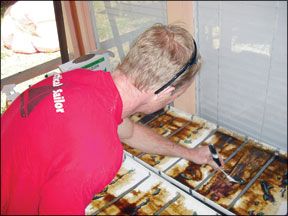
288
cleaner specifically tasked with removing grease.
When a reader mentioned his upcoming plans to clean his grimy engine pan liner this winter, we checked our files and what was on the market. Finding two shelves of degreasers at our hardware store, and no recent data of our own, we were irresistibly drawn (by The Force?) into a head-to-head test.
The process behind cleaning surface grease is fairly straightforward. Grease is acidic, so an alkaline formula will usually do the trick, penetrating and breaking down the grease. Ammonia, commonly used in oven cleaners, is highly alkaline, but its potentially harmful fumes make it less desirable for use in enclosed spaces on board. It will also remove any wax on gelcoat exteriors. Although we are routinely exposed to low levels of ammonia that naturally occur in the environment, high levels, particularly the fumes, can be hazardous. Ammonia should always be used in a well-ventilated area, and never mixed with chlorine, which can form poisonous chloramine gas.
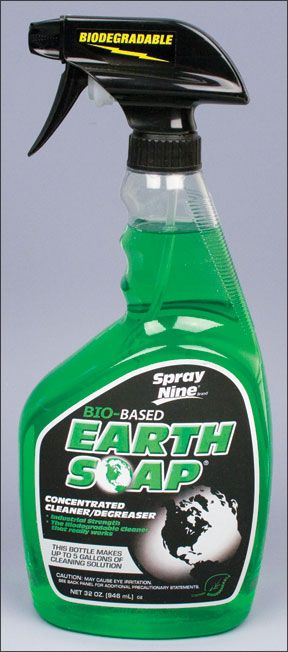
144
Not surprisingly, many of the cleaners in this test used citrus-based alkaline for cleaning instead of ammonia. These cleaners should also be used in a well-ventilated area, but they are generally less harmful. Despite the environmental claims of some of these cleaners, we do not advise pumping oily waste water overboard, which is against the law.
What We Tested
Several types of degreasers are on the market—aerosol sprays, gels, foams, and liquid products. Practical Sailor chose the latter, which come in bottles with trigger sprays. The liquid degreaser seems to be the most logical all-around grease cleaner for a sailor. The aerosols are used mostly to clean tools and machinery, while the gels and foams are not as easy to work with as the trigger-spray cleaners.
Practical Sailor picked up just about any product we could find at the local marine chandleries and hardware stores that claimed to clean grease. Initially, we came up with close to 30 products. For the sake of project containment, we weeded out the general-purpose cleaners that ranked grease-fighting low among their superpowers. These were set aside for a multi-stain cleaning test later this year.
After culling the generalists (anachronisms, some might say) from the herd, Practical Sailor came away with 11 specialized
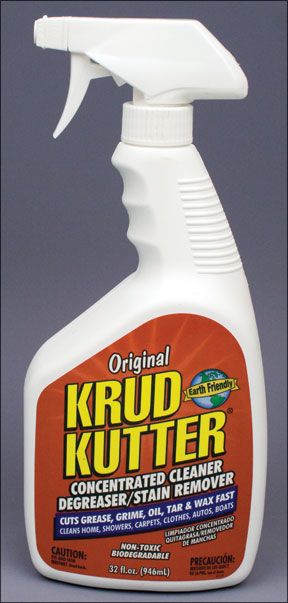
144
products, many with “degreaser” in their monikers. Among the most interesting names: Holy Cow Heavy Duty Degreaser and Krud Kutter Degreaser/Stain Remover.
All of the products were labeled as “biodegradable,” although none carry the Environmental Protection Agency’s Design for the Environment logo, indicating a product meets defined environment-friendly standards. A few of them made specific claims about being environmentally friendly, including the two we tested from Star brite—Sea Safe Cleaner/Degreaser and All Purpose Citrus Cleaner Degreaser—and Spray Nine’s Earth Soap Cleaner Degreaser. The latter is made from “renewable agricultural material.” Chomp Multi Purpose Oil Eating Cleaner says it uses “naturally occurring single celled microbes—Nature’s Janitors.”
Some cleaners list their ingredients on the labels—other don’t. Practical Sailor prefers the products that do.
Even though they are sold in a trigger-spray bottle, four of the tested degreasers are marketed as concentrates that can be diluted with water for easier jobs. They are Kafko Oil Eater Cleaner Degreaser, Spray Nine Earth Soap Cleaner Degreaser, T-Greaser, and Holy Cow Heavy Duty Degreaser. The cleaners come in bottles ranging from 22 to 32 ounces. The three least expensive are Holy Cow, Simple Green, and Spray Nine Earth Soap, all coming in at less than 20 cents per ounce. The priciest are Kafko Oil Eater Cleaner Degreaser (93 cents per ounce), MDR Krazy Clean (75 cents per ounce), and Star brite Sea Safe (68 cents per ounce).
Now for the nasty stuff: toxicity. The majority of the products instruct you to flush with water if the cleaner gets in the eyes. None of them produced especially strong fumes during tests.
How We Tested
These were all your standard spray-and-wipe products. Some labels instructed the user to wait 30 seconds after applying, others instructed the user to immediately wipe the surface.
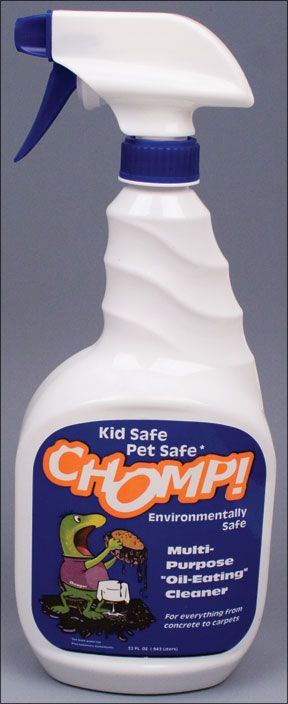
144
One cleaner—Spray Nine Grez-Off—warned the user to make sure not to let the product dry.
For controlled panel testing, Practical Sailor used two 4-foot by 2-foot fiberglass deck hatch lids off an old sailboat. We utilized the underside of each panel, sectioning off the gelcoat surface in 7-inch-wide strips. The panels were liberally coated with a blend of grease, dirty engine oil, soot, and dirt (in stain-fighting parlance, this is known as greasy grime). The panels were allowed to ferment outside for a few days.
The second test platform was a 12-cylinder diesel engine at a vegetable farm near Practical Sailor’s home office in Sarasota, Fla. The engine was one of several powering irrigation pumps serving fields of watercress and arugula. Testers sectioned off the engine’s grease-coated engine bed into 3-inch by 3-inch squares and went to work. (No grease or oil was allowed to escape the high catch basin beneath the engine.)
For each of the cleaning tests, the evaluators applied the product as directed, then cleaned the area as best as possible, applying even pressure with a clean rag. Each section was checked for remaining dirt or grease by passing a clean, white cloth over the cleaned area, a variation of the butler’s white glove test. The more grease on the snippet of cloth, the lower the score. The greasy engine beds were cleaned first, the greasy fiberglass panels a few days later.
Each test was repeated several times, and each time, the sample rags were later compared side by side to see which
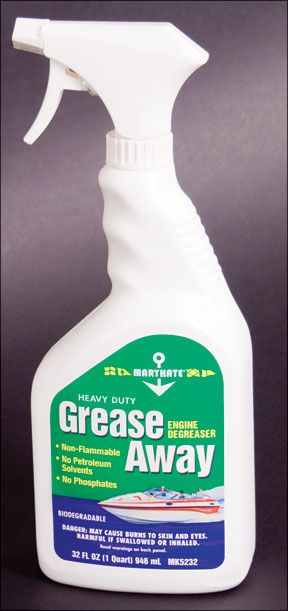
144
cleaner was most effective. The field was gradually whittled down to two cleaners, and finally an overall winner.
In addition to the effectiveness of the cleaner, price and ease of use helped determine the final recommendations.
Test on Fiberglass
In the fiberglass panel test, five cleaners scored Excellent, leaving their sections squeaky clean, and in the “white glove” test, their respective pieces of rag appeared to be clean. Those five were Star brite Sea Safe Cleaner/Degreaser, Chomp Multi Purpose Oil Eating Cleaner, Krud Kutter Degreaser/Stain Remover, Mary Kate Grease Away Engine Degreaser, and Spray Nine Earth Soap Cleaner Degreaser. The majority of the remaining products were given Good ratings, which meant they left a thin film on the panel and their wipe rag was dirty. They were MDR Krazy Klean, Spray Nine Marine Grez-Off, Holy Cow Heavy Duty Degreaser, T-Greaser, and Kafko Oil Eater Cleaner Degreaser. The only Fair was Extreme Simple Green Motor Sports Cleaner and Degreaser, which left slightly more grease than those products with Good ratings.
The farm machinery presented a more difficult test for our fleet of grease fighters. The grease on the water-pump engine was hard, thick, and caked with soot.
After the first round of engine cleaning, four products stood out from the rest with commendable cleaning jobs: Krud Kutter Degreaser/Stain Remover, Holy Cow Heavy Duty Degreaser, T-Greaser, and Mary Kate Grease Away Engine Degreaser. The test was repeated again on a different sections of the engine,
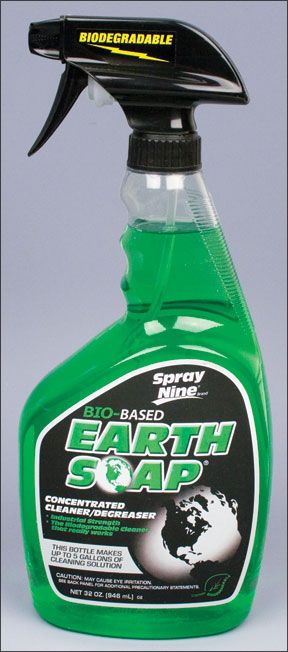
144
finally yielding two clear winners: Krud Kutter Degreaser/Stain Remover and Mary Kate Grease Away Engine Degreaser.
Conclusions











